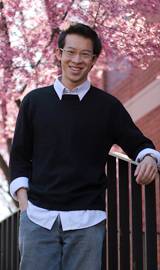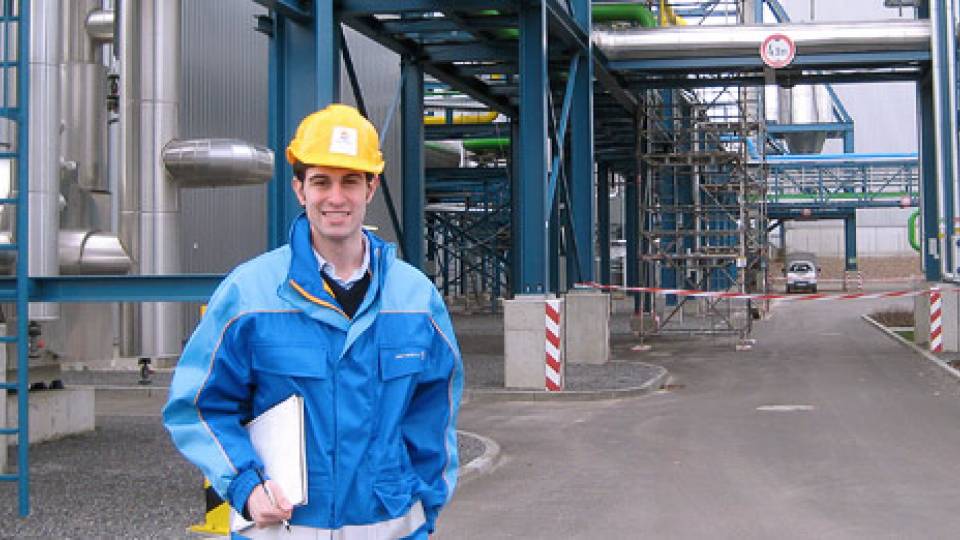Senior Kyle Meng describes the opportunity to spend a year studying
Chinese perceptions of their environment as "the perfect confluence."
Meng will combine interests in his native country, environmental
engineering and public policy next year as the 2005 recipient of the
University's Martin Dale Fellowship.
The $25,000 Dale fellowship is awarded annually to a graduating senior
to allow him or her "to devote the year following graduation to an
independent project of extraordinary merit that will widen the
recipient's experience of the world and significantly enhance his or
her personal growth and intellectual development." Meng's project is
titled "Unearthing the Dragon: Understanding How the Chinese Perceive
Their Environment."
"The Dale fellowship is an unbelievable opportunity, and I'm still in a
state of disbelief that I've been fortunate enough to receive it," said
Meng, who is majoring in civil engineering with a focus on
environmental engineering.
Now a resident of Chappaqua, N.Y., Meng emigrated to the United States
from China when he was 6 years old to join his parents, who had moved
here to pursue advanced degrees. While the family decided to stay in
this country, the Chinese culture remained a significant part of their
lives. Meng grew up speaking Cantonese and English, and has taken
Mandarin at Princeton. He has returned to China with his family several
times to visit relatives.
Last summer, Meng lived in Beijing and worked at the Tsinghua-BP Clean
Energy Research and Education Centre. He conducted research on carbon
dioxide emissions for his senior thesis, titled "Identifying
Opportunities for Carbon Capture and Storage Demonstration Projects in
China."
Carbon dioxide, which comes predominantly from burning carbon-based
fossil fuels such as oil, natural gas and coal, is considered the main
contributor to greenhouse warming. Scientists are interested in
capturing the carbon and sequestering it underground to prevent global
emissions from rising. Meng and his advisers, Michael Celia, professor
of civil and environmental engineering, and Robert Williams, senior
research scientist in the Princeton Environmental Institute, will
present findings from this project in early May at a conference
sponsored by the U.S. Department of Energy in Washington, D.C.
While pursuing his engineering degree, Meng also has explored the arena
of public policy in his academic and extracurricular work. He is
earning a certificate in environmental studies, through which he has
studied the political and humanistic -- as well as the scientific and
technological -- aspects of environmental problems.
He has served as president of the Global Issues Forum, a student
organization dedicated to improving the understanding of global affairs
on campus. He organized a faculty-student China symposium that featured
a keynote address by the Chinese ambassador to the United Nations as
well as fund-raisers for relief efforts in war-torn Darfur, Sudan, and
for tsunami victims in Southeast Asia. He spent the summer of 2003 in
Thailand working as an intern with the International Rescue Committee.
Meng also has other diverse interests. He has played classical piano
for 18 years, frequently performing at Princeton, and is completing a
second certificate in music performance. In addition, he contributes
biweekly columns on a variety of topics related to the Princeton
experience to The Daily Princetonian student newspaper.
As he looks beyond graduation, Meng sees himself combining his passions
for engineering and public policy. "I decided to be an engineer for the
benefits of a technical background," Meng said. "But I'm now interested
in applying that training into policy and service oriented work."
The Dale fellowship represents a significant step toward that goal, and
Robert Williams, his thesis adviser, believes Meng will be successful
in this endeavor.
"Although Kyle's primary training is in environmental engineering, I am
confident that he can make an outstanding contribution in the area of
his proposed research because of his keen intellect, his passionate
love of both China and environmental problem solving, his strong
writing and interpersonal skills, and the talent he demonstrated to me,
as an adviser for his senior thesis, in learning what he needs to know
outside of his field of basic training in order to solve a problem,"
Williams said. "Also, in the environmental analysis field I am
constantly on the lookout for students who can both understand in
detail technical aspects of an environmental problem and appreciate the
broader societal and public policy issues. Kyle is one of those rare
students who has the potential for doing both well."
The idea for the Dale fellowship project jelled while Meng was in China
last summer. Through his research on reducing carbon dioxide emissions,
he experienced firsthand the resistance to dealing with such issues and
observed an environmental movement that is struggling to gain momentum.
He said that the Chinese government, under increasing international
pressure, has become more environmentally friendly in its rhetoric.
However, Meng noted, environmental regulations are rarely enforced
locally.
"Overwhelmed by pressures to develop, local governments often neglect
the principles of sustainability, conservation and accountability in
order to achieve economic growth," Meng wrote in his Dale proposal.
"Instead, what has proven to be the greatest impetus for change have
been the Chinese people … [who] have protested successfully against
polluting businesses and corrupt government officials. If change will
come most effectively through a grassroots movement, it is highly
important that we understand just how the Chinese perceive their
environment."
He plans to focus primarily on how perceptions have changed in light of
China's recent development and how they differ across China's
geographical, socioeconomic and generational divides.
Meng has already begun his project by starting to familiarize himself
with the relevant scholarship -- in English and Chinese -- on the
topic. Once in China, he will collect qualitative and quantitative data
through fieldwork and interviews. While in Beijing last summer, he
contacted Professor Qi Ye, an expert on Chinese environmental policy in
the School of Public Policy and Management at Tsinghua University. He
will serve as Meng's mentor, helping him to gain access to government
officials, environmentalists and members of nongovernmental
organizations.
Meng plans to travel extensively, obtaining much of his information on
perceptions about the environment from the people of China. "Much of my
research will be done through conversations," he said.
Although excited by the thought of what's ahead, Meng said that he's
also a bit daunted by his undertaking. Much of his work will be planned
as he goes along, which he admits is somewhat unsettling.
"I feel fortunate because with the Dale fellowship I'll have so much
freedom to explore and not be confined to a certain institution or a
course of direction," he said. "But at the same time I know that with
so much freedom I will be making decisions as things unravel and might
even feel lost for a good portion of my time in China."
However, Meng said that he is looking forward to the opportunity for
some additional self-discovery next year. "I've had so much exposure to
so many things at Princeton," he said. "It's important for me now to
sort out these experiences and to take time to internalize these new
elements into my life."
He expects that graduate school will be part of his future plans and
also has "a sense that China and the environment will play a very big
role in my life."




